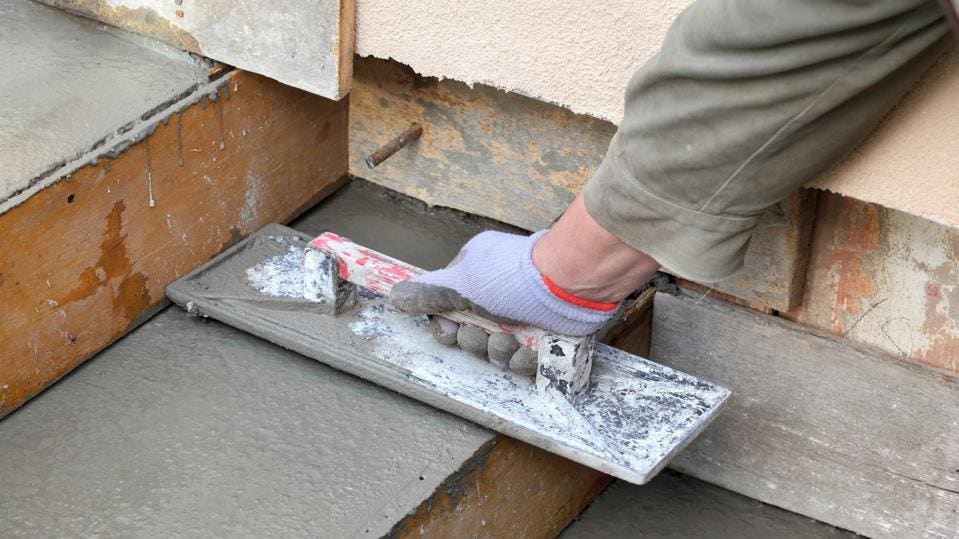Concrete Contractors Colorado Springs are responsible for laying and finishing concrete structures. They can build anything from a sidewalk to a patio, and they also repair damaged concrete features.
When looking for a concrete contractor, choose one who is experienced. Experienced contractors will play an active role in your project and offer suggestions that will elevate the results, like adding concrete stamps.
Concrete contractors must have a strong understanding of the construction industry, including structural standards and customer satisfaction. They also need to ensure that the job is completed on time and within budget. They are also responsible for delivering the right amount of concrete for the project and making sure that all necessary equipment is available on site.
In the past, concrete contractors prepared their own concrete, but today they usually use ready-mix plants that can prepare it on a much larger scale. This helps them save time and money while ensuring that the concrete meets all quality and quantity requirements. However, they should still be knowledgeable about the different types of concrete and their properties to make informed choices about what kind is best for a particular task.
It is also important for concrete contractors to choose a specialty early in their careers. They may prefer to focus on residential work like patios and driveways or commercial projects such as road construction. This is because the skills, knowledge, and tools that are needed to execute each of these tasks are very different.
Once a concrete contractor has decided on a specialization, they should seek out professional development opportunities. One way to do this is by joining a concrete contractors’ association, which will connect them with a network of peers and professionals. These networks can provide concrete contractors with the technical and business advice they need to be successful in their chosen field.
It is also important for concrete contractors to obtain a license from the state in which they operate. Typically, this requires having experience in the industry and passing an exam. In some states, contractors need to carry worker’s compensation insurance and post a bond.
Experience
Concrete contractors are skilled professionals who can take your project from raw materials to a finished, functional structure. They can also help you create a customized design that will suit your personal taste and fit into your space. In addition, a good contractor will be open to your questions and concerns and will provide you with a realistic timeline for the job.
It goes without saying that the more experience a contractor has, the better. This is especially true in labor-intensive construction and building industries such as concrete work. Experience also helps concrete contractors develop a deeper understanding of the industry and how to tackle specific types of projects more efficiently.
A quality contractor will be able to show you examples of their past work that are relevant to your project. They may be able to do this through an online portfolio or by showing you pictures on their phone when you meet with them. You can use these samples to get a feel for the contractor’s style and how their finished products look.
If you need a large-scale commercial concrete project completed, then it is important to choose a company that has the resources to handle the job in an efficient and timely manner. Commercial concrete contractors can build and repair structures for office buildings, malls, hospitals, and other business spaces. They can also install and repair parking lots, bridges, and other infrastructure projects.
If you are looking for a commercial concrete contractor, make sure to select one that is licensed by the state where you live. This will ensure that they are qualified to do the job and will follow all appropriate safety protocols. It is also important to find a company that offers insurance, which will protect you from any liability in the event of an accident on the job site.
Licensing
A concrete contractor must have a license from the Contractor State License Board (CSLB) to do business in the field. To become licensed, a candidate must complete a number of requirements that vary by state, including passing a trades exam, a criminal background check, and a financial statement showing the financial solvency of their business. Applicants also must attend classes in construction science or construction management to learn about the various aspects of the job.
Some states require contractors to be bonded, which is a form of insurance that protects the consumer in case the contractor fails to finish a project or doesn’t pay for a permit or subcontractors. If you’re working with a commercial or residential concrete contractor, ask whether they’re bonded and assess their ability to pay if necessary.
Licensed concrete contractors follow a strict project approach from the beginning to the end of a project, which helps ensure that they complete work on time and meet deadlines. They’ll create a plan, work with the homeowner to prioritize open communication from the start of the project, and make sure that they honor their legal contract. They also know how to avoid common mistakes, such as cutting corners or overcharging, which could result in expensive repairs and a bad reputation.
You can be sure that a licensed concrete contractor will take care of every detail of your project and provide the highest-quality service at a fair price. They’ll have the skills and equipment to get the job done right the first time, saving you money and stress in the long run. They’ll also have liability insurance that covers damages and injuries to workers or guests on the site.
Insurance
Concrete contractors must have the proper insurance coverage in place. This includes general liability insurance, worker’s compensation, commercial auto, and property insurance. These policies will protect a business in the event that an employee is injured on the job or if a client’s property is damaged. Additionally, these plans will cover costs associated with medical expenses or lawsuit settlements.
Concrete contractors work with heavy machinery and tools that can be dangerous. If a visitor or employee is hurt on the premises, a concrete contractor’s workers’ compensation policy will help pay for their medical bills and lost wages. This insurance is mandatory in many states.
While working on a project, a concrete contractor could damage a customer’s property. The general liability portion of this insurance coverage will cover the cost of repairing or replacing the damaged property. Additionally, this policy may include a clause that covers damages to spaces that a concrete contractor rents out. This includes offices, warehouses, and other locations where equipment is stored.
Errors and omissions insurance, also known as professional liability insurance, protects a concrete contractor from claims of negligence, unfulfilled promises, or missed deadlines. This type of policy can pay legal fees and court costs for a concrete contractor as well as provide compensation for damages awarded to the client.
Most clients will ask to see proof of a concrete contractor’s bond and insurance before hiring them. By carrying this documentation, concrete contractors look more professional and separate themselves from their competitors. Additionally, by displaying these documents when pitching jobs to potential clients, they can increase their chances of getting the job.
References
Concrete contractors can add value to your home by installing a patio, pool deck, driveway, or other decorative concrete feature. However, it is important to understand that not all contractors will provide the same level of quality and service. Look for a contractor that has a track record of success with past projects. They should also be able to provide you with references from past clients that attest to their work ethic, craftsmanship, and customer service.
It is also important to ask if the contractor is licensed to perform the work you need. This will ensure that they are a legitimate business with a valid license issued by your state’s authorities. Additionally, it will help protect you if there are any issues with the quality of their work or workmanship.
If you are hiring a concrete contractor for commercial work, they should have the appropriate insurance to cover any damage caused during the project. This includes liability and worker’s compensation coverage. In addition, a commercial concrete contractor should be bonded, which protects you in case the company fails to meet its financial obligations.
A good concrete contractor should be able to provide you with a detailed contract that specifies the work to be performed, project deadlines, price per square foot, who will be doing the work, and any other relevant details. Ideally, the contract should also include a warranty on the work and materials that lasts several years.
While adding a new concrete surface to your home can increase its resale value, it is also a significant expense. As a result, many homeowners choose to finance their renovations with a loan or credit card. Fortunately, many of the best concrete contractors offer financing options for their customers.


 There are two different ways to build a dock, with one being a bubble and the other a removal. The first thing to consider is the climate in your area. If you live in a cold climate, you’ll need to plan to keep your dock warm and dry in case the water freezes over. The materials used for the construction are also important factors. You may want to consult a local dock building company for advice.
There are two different ways to build a dock, with one being a bubble and the other a removal. The first thing to consider is the climate in your area. If you live in a cold climate, you’ll need to plan to keep your dock warm and dry in case the water freezes over. The materials used for the construction are also important factors. You may want to consult a local dock building company for advice.